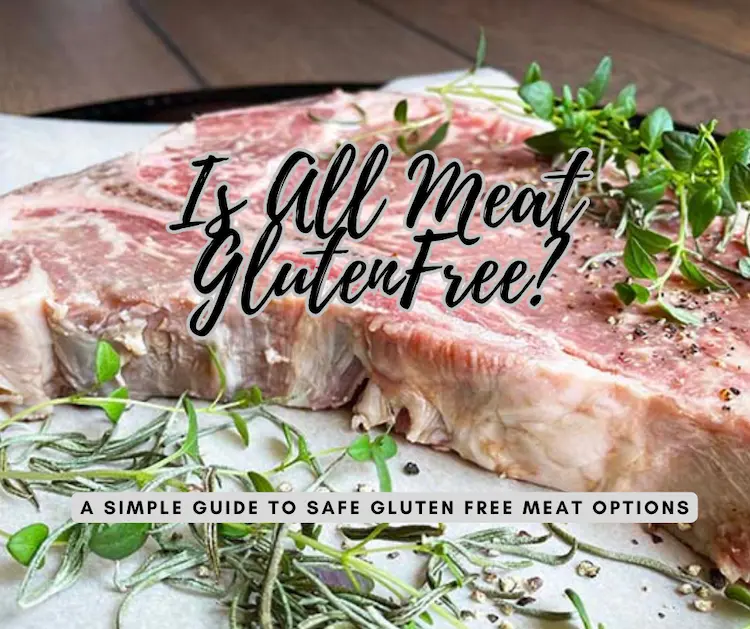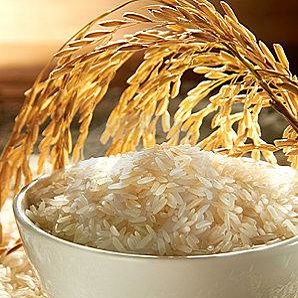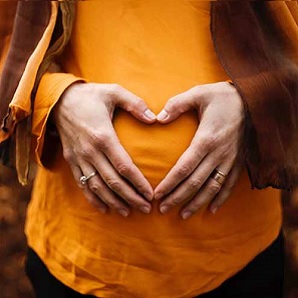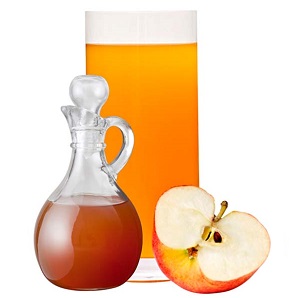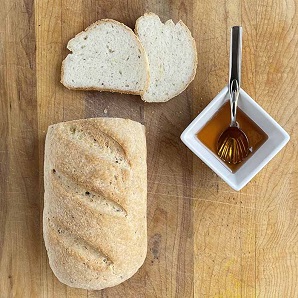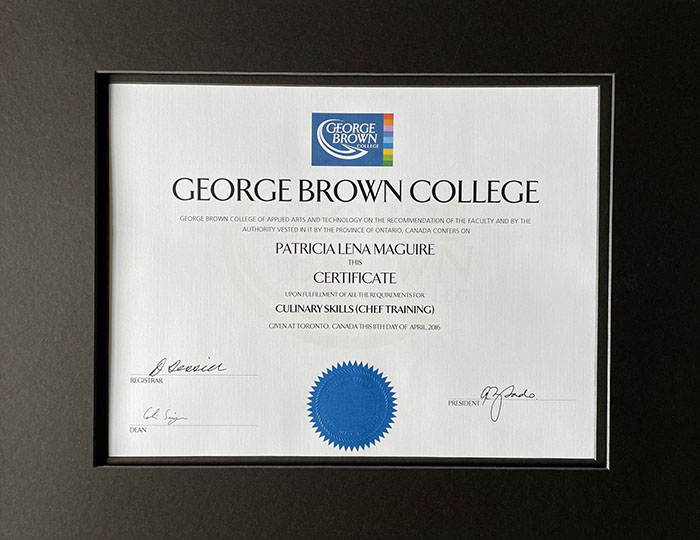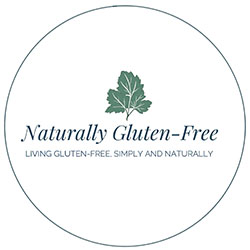- Home
- Living Gluten Free
- Celiac and Miscarriage
Celiac and Miscarriage: A Personal Story of Heartbreak and Triumph
Have you had a miscarriage or two or three and are wondering if celiac disease could be the cause?
Here's one woman's story, what the experts say, and an encouraging note to my sisters who suffer.
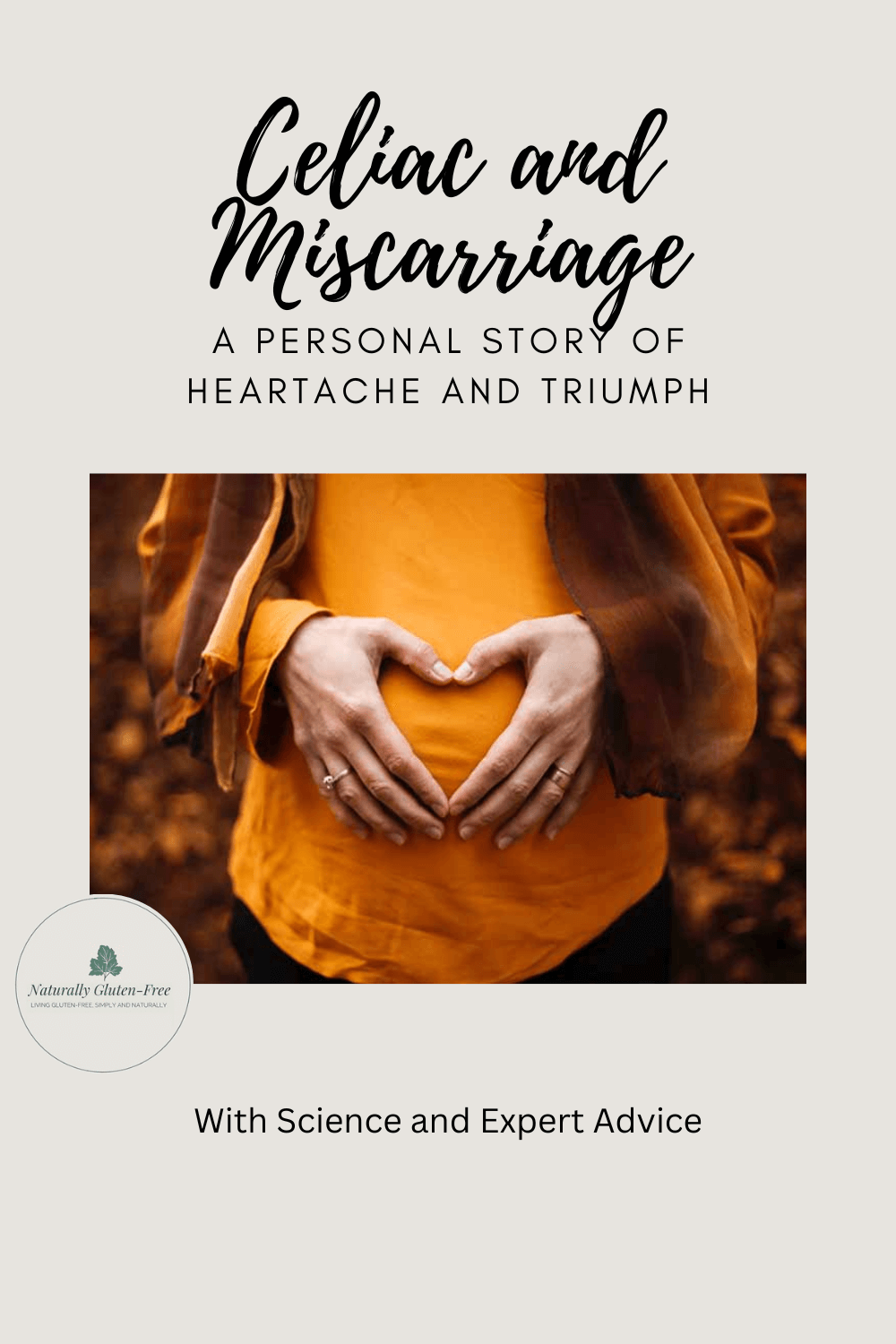
Photo by Alicia Petresc on Unsplash
Do you remember the
day you decided you were ready to start a family?
Maybe you’ve been married for a little while or you’re in that stable relationship that you wanted to have in place before becoming pregnant.
Up to now you’ve been careful. You didn’t want an unplanned pregnancy derailing your career, or locking you into a relationship that you knew wasn’t right, so you waited.
Maybe you even had a scare or two. No birth control method is 100% after all.
Read through or use the links below to jump to the sections that interest you.
Celiac and Miscarriage: One Woman's Journey
That was my story.
It was 1989. I was in my mid-twenties, married for about six months. My husband and I were excited to get started, so I went off the pill.
It would be twenty years before I would even know what celiac disease was let alone be diagnosed myself. So on I went happy and naïve.
Pregnancy # 1: This Is A Breeze
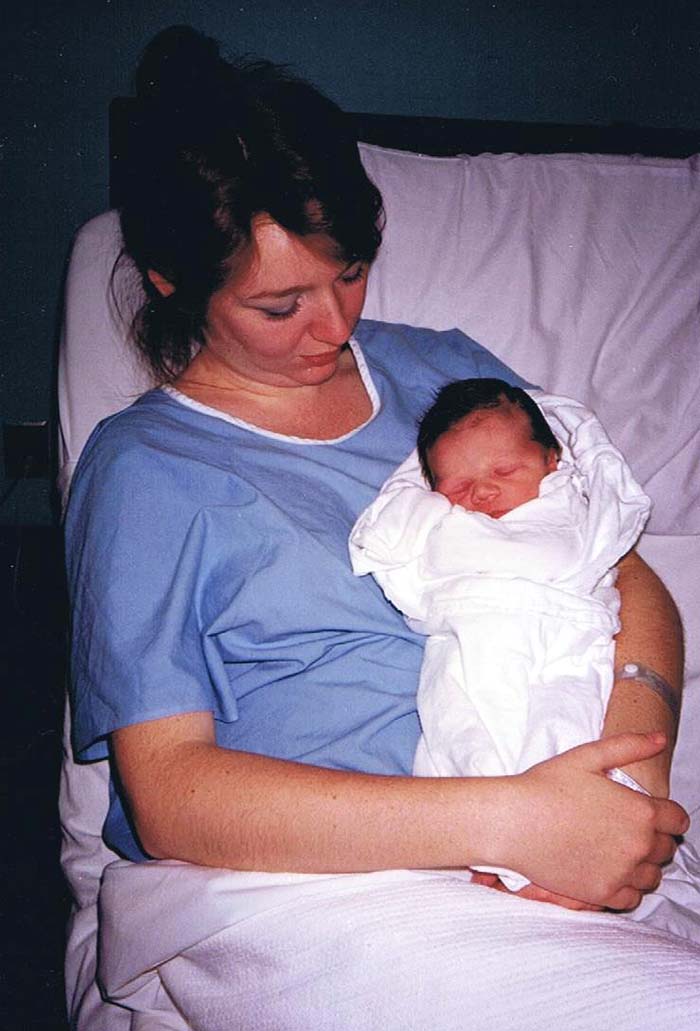
I got pregnant easily and my pregnancy was pretty much textbook.
I followed along with the booklet I got from my doctor and each symptom came along exactly when expected and all those symptoms were fairly mild.
"This pregnancy thing is a breeze I thought."
I tried to eat well. I drank lots of milk and took my pregnancy vitamins. I avoided alcohol and drugs including over the counter pain killers and allergy medications.
When my prenatal instructor asked “What’s been the worst part about being pregnant?” , my answer was “not being able to take anything for my allergies”. I'd had severe seasonal allergies since I was a teenager. Living through August with no antihistamines was pretty tortuous, but if that’s the worst thing you have to report then life isn’t too bad.
I survived August allergies, and in November, a few days after my own birthday, I gave birth to a perfect 8Ib 9oz baby boy.
This isn’t the story you were expecting, is it? Easy time getting pregnant. Relatively easy pregnancy with a joyous outcome.
But the story doesn’t end there.
Celiac disease can lay dormant for years or even decades until some type of trauma triggers it.
Pregnancy and childbirth can be that trauma!
Dermatitis Herpetiformis Shows Its Ugly Face, and Hands.
Although my first pregnancy was pretty easy, I did notice one very strange change in my body.
My skin started doing unusual things.
First was an annoying cluster of plantar warts on my left big toe. It didn’t matter what I did, I couldn’t make them go away. Then like magic, the day after I gave birth they were just gone!
I also started growing things on my body. I guess you'd call them skin tags; little protrusions of skin that would show up out of nowhere. They weren't really a problem but they weren't welcome either.
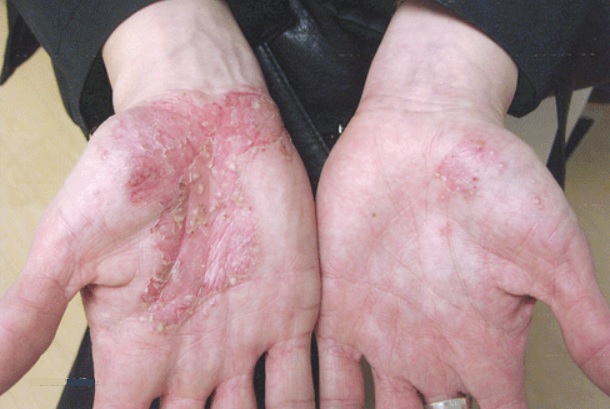
The other skin related change was much more intrusive and much less magical.
I started getting little bumps on my palms that were extremely itchy. Some would swell to become little water-filled blisters that were sore and felt like tiny pebbles under my skin.
My hands look like hamburger. It was embarrassing.
I wouldn’t shake hands and tried to keep them hidden as much as I could. I could see how salespeople looked at me when I stretched out my hand to except change.
I know now that dermatitis herpetiformis is the celiac disease rash.
My doctor said it was contact dermatitis. She told me to keep my hands out of water as much as possible and to avoid soaps and harsh cleaners. She also gave me a prescription for hydro-cortisone cream to keep the rash under control.
These measures helped a bit, but not really.
I think of the pain and discomfort I could have saved myself if I’d know that a gluten free diet would be the cure for this uncomfortable and embarrassing skin condition.
Pregnancy # 2: Let’s Try Again
I should mention that my children’s father and I are now divorced, but at this stage of life we were still hopeful and looking to grow our little family.
By now it was the early nineties, and I was in my late twenties.
I was healthy except for that mysterious skin problem and some minor issues that would crop up in routine bloodwork. There were things like low iron and high liver enzymes, which should also have been clues.
Call an Ambulance!
This second pregnancy and the first were poles apart!
Somewhere between three and four months, I noticed a little spotting. My doctor said it could be nothing but sent me for an ultrasound just to be sure.
If you’ve had a prenatal ultrasound, you know that you have to drink a lot of water before hand and hold it in.
I still marvel to this day how I could be in an office full of medical people, and it took my mother to see that I was in trouble!
I was laying on my back on the ultrasound table and I felt a pop. I don’t know if it was the pressure from all the water but I knew I needed to get to the washroom right away!
I was sitting there, blood flowing from my body not knowing what to do when the receptionist knocked on the door and came in to check on me. What I mistook for concern for my welfare was really concern for the fact that I was taking up the washroom. She let me know in no uncertain terms that I could not stay there.
I had driven myself to the clinic and knew I couldn’t drive home; my husband was watching our son, so I called my mother. Being young and naïve I really thought all I needed was a change of clothes and a ride home.
When my mom showed up, she took one look at me and had the receptionist call an ambulance. I still marvel to this day how I could be in an office full of medical people, and it took my mother to see that I was in trouble! Needless to say, she made the right call. The ambulance attendant said I had lost a lot of blood and needed to get to the hospital right away.
After several hours and a D&C, I was no longer pregnant.
Celiac and Miscarriage: What the Experts Say
From The Mayo Clinic
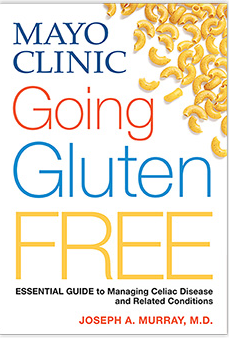
In his book Mayo Clinic: Going Gluten Free, Dr Joseph Murray talks about celiac disease and reproductive issues. He says that celiac disease can affect hormone production which can then affect a woman’s menstrual cycle and ability to get pregnant. If a young woman has particularly heavy periods, or often misses periods then celiac may be suspected.
When it comes to celiac and miscarriage, the cause is not well understood. It could be hormone fluctuations. It could be malabsorption of vitamins and minerals.
Celiac disease can cause other pregnancy complications such as early delivery or low birth weight1.
From Columbia University

For her book, The G Free Diet, Elizabeth Hasselbeck consulted Dr. Peter Green, director of the Celiac Disease Centre at Columbia University.
He reports a similar correlation of celiac disease and recurrent miscarriage as well as other pregnancy issues. He tells us that women with untreated celiac disease experience a 17.8 percent rate of pregnancy loss. This is compared to 2.8 percent for women with celiac who are on a gluten free diet2.
In fact Dr. Green is pretty direct about the correlation between celiac and miscarriage. He suggests that any couple who experiences multiple miscarriages with no other explanation should be tested for celiac disease.
If only I'd known this in the early nineties!
Interesting Findings from An Italian Study
A 2001 study from the University of Salerno in Italy reported tTg activity in the umbilical cord3. This is just one study but may suggest that the relationship between celiac and miscarriage could be about more than just nutritional deficiency. There may be something going on with the immune system. Celiac disease is an auto-immune condition. Auto-immune means that the body attacks a part of itself in the presence of what it interprets as a foreign invader. Could the immune system be attacking the sperm or even the fetus itself?
Celiac and Miscarriage Is A Men's Issue Too
Celiac and pregnancy is not just a women's issue, celiac can also affect male fertility. It can influence testosterone levels as well as quality and quantity of sperm4. So, if a couple is having difficulty conceiving, both partners should be tested for celiac disease.
Celiac and Miscarriage: Back to The Story
Pregnancies 3, 4 and 5: The Worst Was Still To Come
Infertility was not our issue, we got pregnant no problem. It was just hanging on to it that was easier said than done.
I had three more miscarriages after that first dramatic episode at the ultrasound clinic.
When the nurse asked me if I wanted to see her I said “no”. I was exhausted, high on pain killers and a bit freaked out.
I’ve always wondered if I made the wrong decision.
Tons of Testing
There were soooo many tests. I was beginning to feel like a science experiment.
- My husband and I went for genetic testing. No issues.
- I had multiple blood tests that always came back normal. Well except that I often had low iron. Hmmm...
- I had a hysteroscopy. This is a procedure done under general anesthetic. A camera or “scope” was inserted through my vagina into my uterus in search of any abnormality. There was none.
- I was even tested for diabetes, but not for celiac disease.
Learning to Advocate
The next two miscarriages were finalized with a D&C. Not so dramatic but disappointing no less.
Number five was the most dramatic, and traumatic episode yet.
I made it to 20 weeks, that’s five months, before the routine ultrasound revealed that the baby had died. You’d think I’d be devastated, but to be honest I was kind of numb, and scared.
My OBG had mentioned that a dead fetus can harm the mother, yet he didn’t seem to be in a hurry to resolve this. He said nature would take its course I would miscarry naturally.
By this time, I’d learned to advocate for myself so I contacted my GP. With her help we got agreement that this needed to be taken care of ASAP. It was too late in the pregnancy for a D&C, the risk of bleeding was too high, so I was told I'd have to give birth. I was admitted to hospital, had labor induced and delivered the baby. It was a little girl.
When the nurse asked me if I wanted to see her I said “no”. I was exhausted, high on pain killers and a bit freaked out.
I’ve always wondered if I’d made the wrong decision.
Pregnancy # 6: Success as Last!
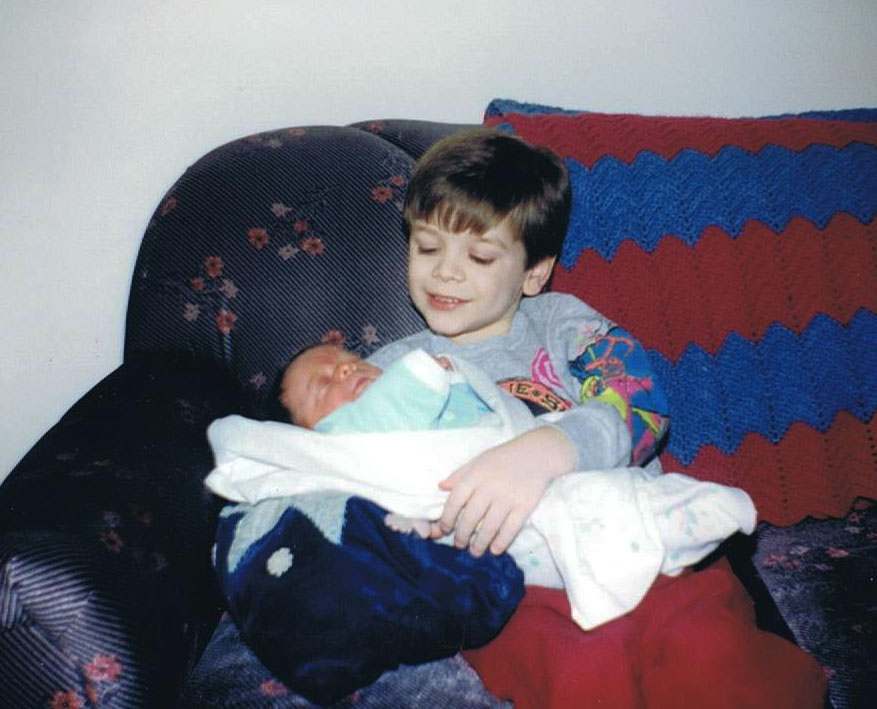
You might think I’d give up, and to be honest I’m not really sure why I didn’t. I think I just felt strongly that I was meant to have two children.
So, we decided to try one more time. This, I was clear, was the last time. If things didn’t work out, I’d be satisfied with my beautiful little boy and move on.
The pregnancy was difficult.
I was sick all the time and so frustrated. They call it “morning sickness” but morning was the only time I felt well.
Then one day I got a clue.
I was having a rather good day until my husband, son and I decided to go out for ice cream. Soon I was so nauseous I was unable to get up off the sofa. Could this be related to the ice cream?
I’d heard that some people had trouble with milk, but I love milk. Could it be? A little more investigation and I figured out that I felt okay when I first got up in the morning but after I had my cereal, with milk, I started to feel sick. My doctor educated me about lactose intolerance and I tried lactose free products. I also tried adding an enzyme to my milk that would convert the lactose to sucrose. Nothing worked so I just ended up avoiding milk for the rest of my pregnancy.
I’ve since learned that people with celiac often have issues with dairy. This includes lactose, which is the sugar in milk, and casein which is one of the proteins in milk.
Conclusion

Persistence paid off! I gave birth to a healthy baby girl who is now an amazing young woman.
I still marvel at the fact that so many signs were there:
- multiple miscarriages
- dairy intolerance
- skin problems
- low iron
Yet the topic of celiac disease never came up. No one did the math.
It wasn’t until sixteen years after the birth of my daughter that I was finally diagnosed. The lights, one by one started coming on to illuminate the events of my past.
To My Sisters
My story is just one woman’s journey with celiac and miscarriage.
It is my hope that my story can help someone with similar issues to get help. And I hope that help comes long before the fourth miscarriage.
If I have any advice to offer it's this:
- Advocate for yourself. Do whatever you need to to get the care and attention you need.
- Think of any other health issues you've had. This may not be "just" about fertility.
- Don't give up!
There has been more research since the early nineties and more understanding of celiac disease. I’m hoping this means timelier testing and diagnosis for women experiencing pregnancy and fertility issues.
A quick search of the Canadian Celiac Association forum brings back many heart wrenching stories so I know my sisters are still out there and still suffering.
References
1. Murray, J. A. (2014). Mayo Clinic going gluten-free. Time Home Entertainment Inc.
2. Hasselbeck, E. (2011). The G free diet: a gluten-free survival guide. Distributed by Amazon Digital Services.
3. Sblattero, D. (2009). Anti-Tissue Transglutaminase Antibodies from Celiac Patients Are Responsible of Trophoblast Damage via Apoptosis in Vitro. A Possible Role for Infertility
4. R., G. P. H., & Jones, R. (2020). Celiac disease: A hidden epidemic. William Morrow, an imprint of HarperCollinsPublishers.





